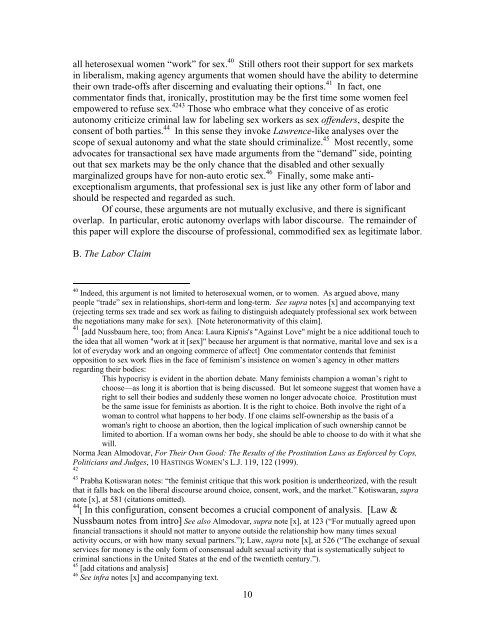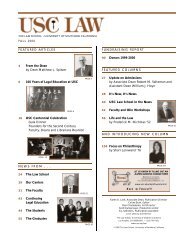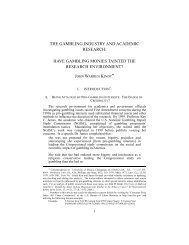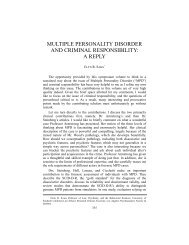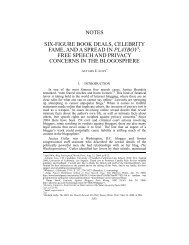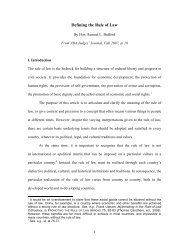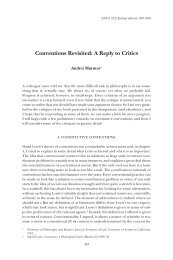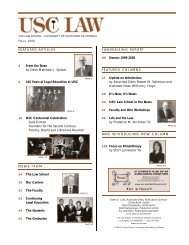1 Regulating Sex Work Adrienne D. Davis VERY ROUGH DRAFT ...
1 Regulating Sex Work Adrienne D. Davis VERY ROUGH DRAFT ...
1 Regulating Sex Work Adrienne D. Davis VERY ROUGH DRAFT ...
You also want an ePaper? Increase the reach of your titles
YUMPU automatically turns print PDFs into web optimized ePapers that Google loves.
all heterosexual women “work” for sex. 40 Still others root their support for sex markets<br />
in liberalism, making agency arguments that women should have the ability to determine<br />
their own trade-offs after discerning and evaluating their options. 41 In fact, one<br />
commentator finds that, ironically, prostitution may be the first time some women feel<br />
empowered to refuse sex. 4243 Those who embrace what they conceive of as erotic<br />
autonomy criticize criminal law for labeling sex workers as sex offenders, despite the<br />
consent of both parties. 44 In this sense they invoke Lawrence-like analyses over the<br />
scope of sexual autonomy and what the state should criminalize. 45 Most recently, some<br />
advocates for transactional sex have made arguments from the “demand” side, pointing<br />
out that sex markets may be the only chance that the disabled and other sexually<br />
marginalized groups have for non-auto erotic sex. 46 Finally, some make antiexceptionalism<br />
arguments, that professional sex is just like any other form of labor and<br />
should be respected and regarded as such.<br />
Of course, these arguments are not mutually exclusive, and there is significant<br />
overlap. In particular, erotic autonomy overlaps with labor discourse. The remainder of<br />
this paper will explore the discourse of professional, commodified sex as legitimate labor.<br />
B. The Labor Claim<br />
40<br />
Indeed, this argument is not limited to heterosexual women, or to women. As argued above, many<br />
people “trade” sex in relationships, short-term and long-term. See supra notes [x] and accompanying text<br />
(rejecting terms sex trade and sex work as failing to distinguish adequately professional sex work between<br />
the negotiations many make for sex). [Note heteronormativity of this claim].<br />
41<br />
[add Nussbaum here, too; from Anca: Laura Kipnis's "Against Love" might be a nice additional touch to<br />
the idea that all women "work at it [sex]" because her argument is that normative, marital love and sex is a<br />
lot of everyday work and an ongoing commerce of affect] One commentator contends that feminist<br />
opposition to sex work flies in the face of feminism’s insistence on women’s agency in other matters<br />
regarding their bodies:<br />
This hypocrisy is evident in the abortion debate. Many feminists champion a woman’s right to<br />
choose—as long it is abortion that is being discussed. But let someone suggest that women have a<br />
right to sell their bodies and suddenly these women no longer advocate choice. Prostitution must<br />
be the same issue for feminists as abortion. It is the right to choice. Both involve the right of a<br />
woman to control what happens to her body. If one claims self-ownership as the basis of a<br />
woman's right to choose an abortion, then the logical implication of such ownership cannot be<br />
limited to abortion. If a woman owns her body, she should be able to choose to do with it what she<br />
will.<br />
Norma Jean Almodovar, For Their Own Good: The Results of the Prostitution Laws as Enforced by Cops,<br />
Politicians and Judges, 10 HASTINGS WOMEN’S L.J. 119, 122 (1999).<br />
42<br />
43<br />
Prabha Kotiswaran notes: “the feminist critique that this work position is undertheorized, with the result<br />
that it falls back on the liberal discourse around choice, consent, work, and the market.” Kotiswaran, supra<br />
note [x], at 581 (citations omitted).<br />
44<br />
[ In this configuration, consent becomes a crucial component of analysis. [Law &<br />
Nussbaum notes from intro] See also Almodovar, supra note [x], at 123 (“For mutually agreed upon<br />
financial transactions it should not matter to anyone outside the relationship how many times sexual<br />
activity occurs, or with how many sexual partners.”); Law, supra note [x], at 526 (“The exchange of sexual<br />
services for money is the only form of consensual adult sexual activity that is systematically subject to<br />
criminal sanctions in the United States at the end of the twentieth century.”).<br />
45<br />
[add citations and analysis]<br />
46<br />
See infra notes [x] and accompanying text.<br />
10


